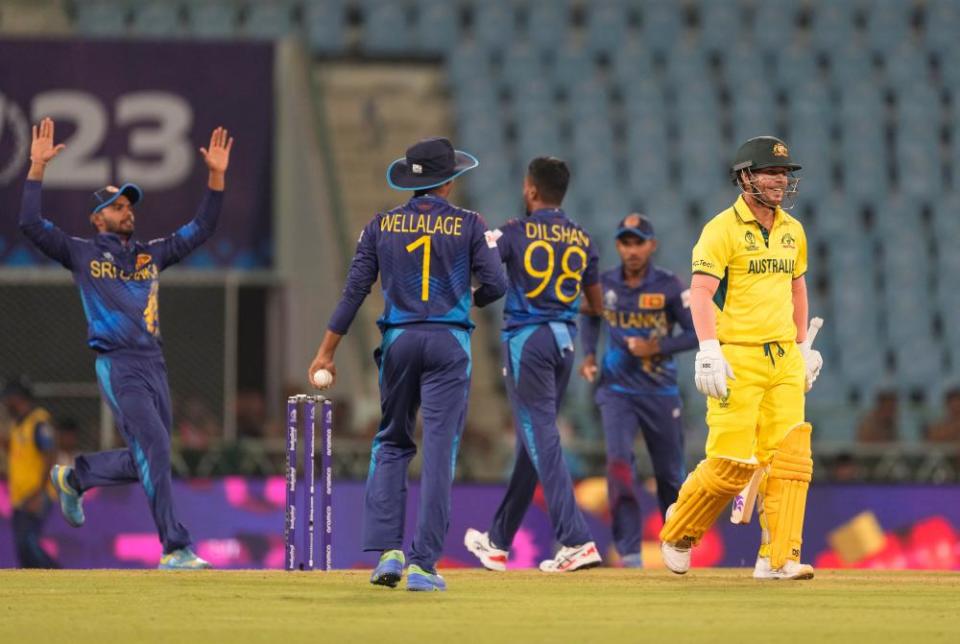
Almost 15 years after David Warner made a historic debut for Australia, the dynamic opener continues to surprise, but not always with the quality of his cricket. Riding high with adrenaline after Australia broke its duck against Sri Lanka in the 50-over World Cup in India, the veteran made a proposal that would radically alter cricket.
Despairing after a DRS call regarding an LBW went against him in a match which he turned in the field, Warner said umpires must be held accountable and that the accuracy rates regarding their decision-making should be publicised during matches.
Presumably the bracket outlining the form an umpire is in would feature alongside gimmicks such as “kiss cams” and other flourishes accompanying short-form cricket.
Related: Pat Cummins comes to life to give Australia’s World Cup campaign lift-off | Geoff Lemon
“Players’ stats go up on the board as you walk out to bat,” Warner said. “When they announce the umpires, I’d love to see their stats come up on the board as well. Obviously players get dropped for poor performances. It’s never explained to us what goes on with the panel [of umpires] as well. So [stats are] just an indicator.”
The veteran changed the course of the match against Sri Lanka with his brilliance in the field and his two outstanding catches may have provided the spark Australia needed to shake its lethargy.
Warner’s comments about umpires may appeal to those who revel in negativity on social media, and it should be noted he is far from alone when it comes to players making clear their frustration towards umpires on and off the field in recent years. But any administrator considering the future of cricket, and the role officials and umpires play in fostering the sport from the grassroots level, should and will give this idea short shrift.
It is just over a decade since decorated umpire Simon Taufel observed that the introduction of DRS technology into the game, while ensuring greater accuracy, had pitfalls for officials. The Australian, who was the ICC Umpire of the Year between 2004 and 2008, said the additional scrutiny on decisions made by umpires was counter to the spirit of cricket.
“I think we’re creating an environment where it is OK for a player to question an umpire’s decision and that does not sit comfortably with me,” he told ESPN in 2011. “As a player, I was always taught to accept the umpire’s decision and get on with the game. I think we are breaking that down a little bit. As a parent and spectator, I’m not comfortable. I appreciate the game is different at the international level and it is a professional occupation. But it is a game, and it has to uphold certain values.”
Shortly before Taufel spoke of his concerns, Daryl Harper withdrew from officiating what would have been his final Test between India and the West Indies due to criticism. Retired champion MS Dhoni was among the critics, but after Harper’s decision to exile himself, the ICC published his accuracy rate against India, noting it was 96%.
Related: The Spin | Nabi’s nomadic journey from beating Gatting to historic win over England
In an endeavour where decisions are made based on split-second action, this is excellent. Taufel’s concerns then remain a legitimate fear now. Sporting codes struggle to attract enough officials at lower levels, in part due to the level of abuse directed towards them. Organisations are mindful of the importance of maintaining respect towards those officiating in professional competitions in the hope the example trickles down to lower levels as well.
Children buy shirts bearing the names of their cricketing idols. They wave banners for heroes including Warner. But those officiating aspire to excellence of a different type. An anonymous umpire is one who is excelling in their role. Their best work is unrecognised.
Warner’s proposal, regardless of the motivation, could invite a ripple-down effect of ridicule. His assertion umpires are unaccountable is also contrary to fact. Performance is important and umpires can and are dropped, some of them with very public profiles.
Billy Bowden, with his “crooked finger of doom” and cameo in Slumdog Millionaire, was the antithesis of a low-profile umpire. But his fame did not provide him immunity from below-par performances, with the New Zealander twice being dropped from the ICC elite panel, with finality in 2015.
A final golden summer awaits Warner, including the remainder of this World Cup and the Test series against Pakistan and the West Indies that will conclude a long, decorated career. It also provides an opportunity to offer a level of respect to those who, similarly to him, have reached this level through sustained excellence and continue to strive for accuracy.
Article courtesy of
Source link